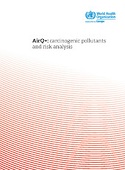AirQ+: carcinogenic pollutants and risk analysis (2020)

Download
AirQ+ is a software tool for quantifying the health burden and impact of air pollution developed by the WHO Regional Office for Europe. AirQ+ includes methodologies to assess the impacts of short- and long-term exposure to ambient air pollution. The main methodologies use evidence generated by epidemiological cohort studies showing a relationship between average long-term air pollution concentration levels and the mortality risks in exposed populations. Assessing the impact of air pollution is suggested when evaluating the consequences of policies and interventions or of hypothetical scenarios. AirQ+ should always be used with the support of an epidemiologist or air pollution impact assessment expert. To facilitate users in their analyses, AirQ+ comes with manuals that require increasing levels of expertise. This manual describes how AirQ+ can be used to estimate the risk of cancer due to lifetime exposure to a carcinogenic air pollutant. AirQ+ can calculate risk based on unit risk originated by occupational studies or toxicological data. Users with data on the concentrations of specific substances in the air but without data on classical air pollutants can use AirQ+ to quantify the risk of developing cancer using unit risk values. The AirQ+ software uses default unit risk values for arsenic, benzene, benzo[a]pyrene, chromium, nickel and vinyl chloride.



